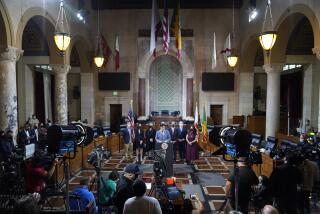Coronavirus has shut much of L.A., but many city employees are still heading to work

As businesses across Los Angeles temporarily close or ask employees to work from home to stem the spread of the novel coronavirus, the city’s more than 50,000 government employees are still being asked to go to work, with several exceptions, according to emergency guidelines issued by the city’s personnel department.
City employees can’t refuse to go to work out of fear that they’ll be infected with the virus, Wendy Macy, general manager of the city’s personnel department, wrote in a memo to department heads Friday. Telecommuting options are available for some employees, though, the memo said.
At the end of business day Monday, however, Los Angeles Mayor Eric Garcetti announced the city would put out new guidelines for employees on Tuesday, suggesting that more employees could telecommute, unless they can’t or are a critical city worker.
“I think we are going to flip from what we have today,” Garcetti said.
The rise in coronavirus cases in California has prompted city officials to enact sweeping measures to try to slow the spread. Garcetti on Sunday ordered restaurants to stop dine-in service and for all gyms, nightclubs and other venues to close until the end of the month. He also has implemented a ban on all public gatherings of 50 people or more at city-owned properties, prompting Griffith Observatory, the Los Angeles Zoo and the city’s public library system to shut down.
Coronavirus FAQs
Los Angeles County will close all county government buildings Monday, Los Angeles County Board of Supervisor Kathryn Barger announced Sunday.
Gov. Gavin Newsom also has called for the closure of all bars, nightclubs and wineries across the state, and urged people 65 or older and those with chronic health conditions to stay indoors for the foreseeable future.
It’s unclear how many city of Los Angeles employees are 65 or older. A handful of Los Angeles City Council members fall in that age group, including Gil Cedillo, who represents several Eastside neighborhoods. Cedillo said Sunday night he plans to attend Tuesday’s scheduled council meeting, telling The Times: “I have balanced the minimal risk with the greater need for leadership at this point in time.”
The city is one of Los Angeles County’s biggest employers, with its workers trimming trees, paving roads, issuing building permits, directing traffic and answering 311 phone calls. The city also offers walk-in counters so the public can access financial, planning and development services.
The city’s development services centers are still open on an appointment basis to the public at several city buildings, including Figueroa Plaza in downtown, according to a mass email sent Friday by the Planning Department.
At least one city employee said he was worried.
“I worry about my friends who work at the public counter,” said the employee who asked to remain anonymous because he wasn’t authorized to speak to reporters. “We’re putting the workers at risk.”
Yeghig Keshishian, a spokesman for the Planning Department, said the health and safety of its employees, their families and the public is a priority.
“That’s why we moved to an appointment-only system at our public counters and are partnering with our fellow departments to limit the concentration of people in our public buildings to create space for our employees to be healthy,” he said.
Garcetti on Monday noted that the public counters have been open, albeit with restrictions, and that “tomorrow we will go further” in terms of guidance about telecommuting.
Alex Comisar, spokesman for Garcetti, said over the weekend that the city is taking guidance from public health experts on its leave policy. “The city has a duty to deliver critical services throughout this public health crisis,” Comisar said. “That means we need healthy workers on the job.”
City workers who have been diagnosed with the coronavirus, have been exposed to someone who is sick, exhibiting symptoms or recently traveled to a region affected by the virus should telecommute, take sick time, paid leave or compensated time off, according to Macy’s memo.
And workers who have an underlying medical condition that could make them more vulnerable to the virus may be able to telecommute, according to the memo.
Macy’s directive applies only to nonessential workers. Essential workers are classified as police, firefighters and others who perform key city services, but it’s unclear how many workers fall into that category.
“This is an emergency situation and none of these guidelines should be construed as a permanent change to policy,” the memo states.
Many federal workers are still being asked to report for work across the country. The White House on Monday asked federal departments operating in the Washington, D.C., area to maximize telecommuting options for employees. The U.S. Securities and Exchange Commission also has reportedly asked some employees to work from home.
Service Employees International Union 721, which represents thousands of workers in the city and county, has been sending updates to its members about the virus and workplace safety in recent days.
In response to the memo, Bob Schoonover, president of SEIU Local 721, told The Times that the union is glad the city is accommodating the “emerging needs of their public workers.”
“It will be important for the city to continue to revisit their policies as the situation develops in order to continue to minimize the impact on the working families who not only deliver the public services to this city, but also reside in our communities,” Schoonover said Sunday.
Tree trimmer surgeon Art Sweatman works in a city office at Broadway and 12th Street and said Sunday that workers were still coming into the office last week. “We’re not in panic mode,” Sweatman said.
Still, on Friday, Sweatman’s managers asked employees for a list of duties they could do at home in case more are forced to telecommute, he said.
The closure of Los Angeles Unified School District on Monday also will likely force city workers to stay at home. Larger employers must allow their workers to take time off for a child-care provider or school emergency under state law.
Times staff writer Emily Alpert Reyes contributed to this report.
More to Read
Sign up for Essential California
The most important California stories and recommendations in your inbox every morning.
You may occasionally receive promotional content from the Los Angeles Times.











